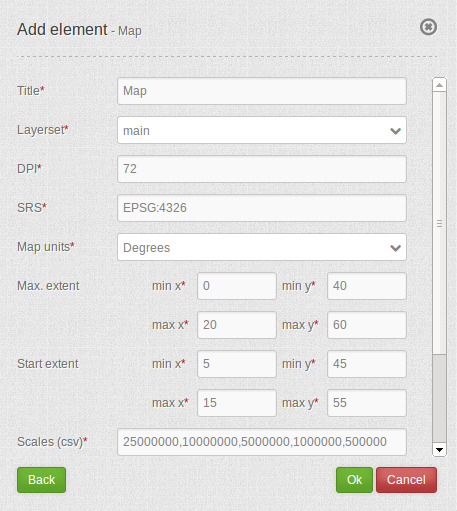Map¶
MapQuery/OpenLayers based map. You have to define the units, the start and max extent, scales and supported projections.

Configuration¶

YAML-Definition:
layerset: null # refer to a layerset, define the layerset first and refer to it
dpi: 72 # resolution, default is 72
srs: "EPSG:4326" # coordinate reference system. Two ways of srs definitions are supported:
- "EPSG:CODE" or
- "EPSG:CODE|MY SRS TITLE"
units: "degrees" # units to use degrees/meters, default is deegrees
extents: array(
max: array(0, 40, 20, 60)
start: array(5, 45, 15, 55)) # map extents
scales: "25000000,10000000,5000000,1000000,500000" # a csv scale list
maxResolution: "auto" # at the moment only auto is supported, so please do not change
otherSrs: array(
"EPSG:31466",
"EPSG:31467",
"EPSG:25832") # other coordinate reference systems. Two srs definitions are supported:
- ["EPSG:CODE","EPSG:CODE"] or
- ["EPSG:CODE|MY SRS TITLE","EPSG:CODE|MY SRS TITLE"]
imgPath: "bundles/mapbendercore/mapquery/lib/openlayers/img" # path of images
Class, Widget & Style¶
- Class: Mapbender\CoreBundle\Element\Map
- Widget: , mapquery//lib//openlayers//OpenLayers.js, mapquery//lib//jquery//jquery.tmpl.js, mapquery//src//jquery.mapquery.core.js, proj4js//proj4js-compressed.js, mapbender.element.map.js
- Style: mapbender.elements.css, mapquery//lib//openlayers//theme//default//style.css
HTTP Callbacks¶
None.
JavaScript API¶
center¶
<>
highlight¶
<>
layer¶
<>
appendLayer¶
<>
insert¶
<>
rebuildStacking¶
<>
move¶
Moves a layer up (direction == true) or down (direction == false) on the same level in the layer hierarchy.
zoomIn¶
<>
zoomOut¶
<>
zoomToFullExtent¶
<>
zoomToScale¶
<>
panMode¶
<>
addPopup¶
<>
removePopup¶
<>
removeById¶
<>
layerById¶
Searches for a MapQuery layer by its Mapbender id. Returns the layer or null if not found.
scales¶
<>
setMapProjection¶
<>
getAllSrs¶
<>
ready¶
<>
JavaScript Signals¶
None.
Controlling by URL¶
Make Layer visible¶
If you have a Layer with the id <layerid> in a service with the id <serviceid> you may pass the URL parameter visiblelayers to turn the layer visible:
?visiblelayers=<serviceid>/<layerid>
You may pass multiple such layers, seperated by comma.
The layerid and serviceid values are specific to an application. You can get the layerid and serviceid in the specific application, namely in the layerset and there in a layer. Each layer has an icon with three small dots on the right side. Click on the icon and a popup window will appear.

The first value lists the internal SourceID and SourceLayerId (31-591). The seconds value lists the InstanceID and InstanceLayerId, that we want to use now (73-836).
Use this values for the “visibleLayers” parameter in your URL, and seperate them by a slash.
For example: http://localhost/mapbender/application/myapp?visiblelayers=73/836
If you have two layers that are not visible by default, put the two values of layerid and serviceid into the URL and seperate them by a comma.
For example: http://localhost/mapbender/application/myapp?visiblelayers=73/836,73/840
Passing POIs¶
You can pass one or more POIs in the URL. Each POI has the following parameters:
- point: coordinate pair with values separated by comma (mandatory)
- label: Label to display (optional)
- scale: Scale to show POI in (optional, makes only sense with one POI)
If you pass more than one POI, the map will zoom to 150% of the POIs bounding.
To pass a single POI, use the following URL format:
?poi[point]=363374,5621936&poi[label]=Label&poi[scale]=5000
To pass multiple POIs, use the following format:
?poi[0][point]=363374,5621936&poi[0][label]=Label%201&poi[1][point]=366761,5623022&poi[1][label]=Label%202
Passing BBOX¶
You can pass a BBOX to zoom to by using the following URL query parameter:
?bbox=364286,5622263,365979,5622806
